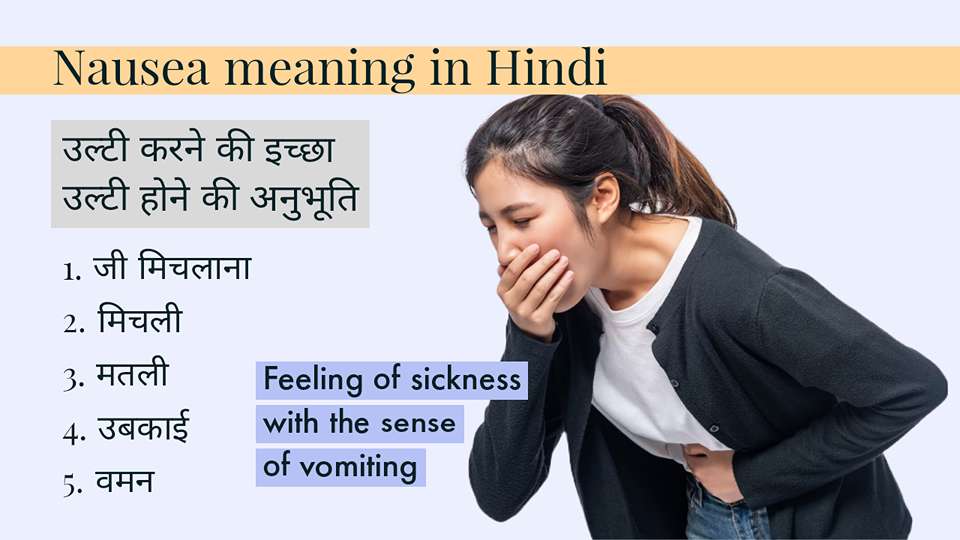
Nausea meaning in Hindi
Nausea meaning in Hindi is Michali or Matali (Ultee hone ki aanuvuti). Michali/Matali is the actual Hindi word for nausea. Nausea, translated as 'ji michalaana' in Hindi, refers to a feeling of sickness with the sense of vomiting. It is the subjective sense of discomfort with the urge to vomit.
Nausea is commonly known as “Bamaan” or “Okai” in Hindi. There are other synonyms to describe Nausea meaning in Hindi. But to be specific, “Michali" (ji michalaana) is the actual typical meaning of Nausea in Hindi.
Other synonyms more likely indicating the meaning of nausea meaning in Hindi are Michali, Matali, Bamaan, Okai, Ubakai, Ultee hone ki aanuvuti, Ultee karne ki ichchha, etc.

Here below, the synonyms & Antonyms of nausea meaning are given in tabulated form both in Hindi & English side by side.
Synonyms of Nausea meaning in Hindi
| Hindi | English |
| Ji michalaana | Nausea |
| Michali | Nausea, a tendency toward vomiting |
| Matali | Nausea, Sickness |
| Bamaan | Vomit, puke, spew |
| Okai | Vomit |
| Ubakai | Vomiting, queasiness, puke, spew |
| Samudri beemaari | feeling of nausea |
The synonyms of nausea meaning which are closely related are vomit, puke, queasiness, spew, biliousness, sickness, morning sickness, altitude sickness, sea sickness, travel sickness, motion sickness, etc.
Nausea meaning in Bengali, Tamil, Telugu
Nausea meaning in Bengali is Bami bami bh?ba. In Tamil, nausea means Kuma??al. Similarly, nausea meaning in Telugu is Vik?ra?
What is Nausea?
Nausea is a subjective sensation of discomfort or unease in the upper abdomen and back of the throat that leads to an urge to vomit and often precedes actual vomiting. It is a non-specific symptom commonly associated with various medical conditions, including infections, gastrointestinal disorders, medication side effects, motion sickness, and pregnancy. Nausea is regulated by the vomiting center in the brainstem and is often accompanied by other symptoms such as pallor, sweating, and increased salivation.
What is the mechanism of nausea?
The part of the brain responsible for integrating signals throughout the body and converting receives signals from the vomiting center along with the chemoreceptor trigger zone which is located in the medulla. The most obvious sources of pro-nausea input are the GI tract via the vagus nerve, and the vestibular system of the inner ear but there are several others. For example, nausea, and vomiting can be triggered by sensory receptors within the pharynx, as well as those from the heart most classically observed in myocardial ischemia. metabolic derangements and some medications directly stimulate chemoreceptor triggers.
What are the causes of nausea?
The infectious causes of nausea are viral and bacterial acute gastroenteritis and food poisoning and the non-infectious causes are mentioned below.
Abdominal causes of nausea such as esophagitis, gastroparesis, gastric outlet obstruction and small bowel obstruction, acute appendicitis, acute cholecystitis, acute hepatitis, acute mesenteric ischemia, gastric ulcer, and duodenal ulcer;
CNS causes of nausea are hydrocephalus, meningitis, migraine headaches, demyelinating disorders, intracerebral lesions, abscess, infarction, hemorrhage, and neoplasm
Metabolic and endocrine causes of nausea are diabetes mellitus, diabetic ketoacidosis, Addison disease, hyperthyroidism, hyperparathyroidism, hyponatremia, and pregnancy
Drugs causing nausea such as aspirin, antidiabetic medication, acyclovir, antituberculosis drug, erythromycin, sulfonamides, cisplatin, digoxin, etc.
When should one be concerned about nausea?
If you experience nausea that lasts for an extended period, without improvement or becomes recurrent, it's a matter of concern. If your nausea is severe and accompanied by intense discomfort, excessive vomiting, or inability to keep fluids down, you should seek medical attention promptly.
Similarly, Nausea and vomiting can lead to dehydration, especially if you are unable to drink or keep fluids down. Signs of dehydration include dry mouth, dark-colored urine, weakness, and dizziness. If you suspect dehydration, seek medical help immediately.
More importantly, if you experience nausea following a head injury or concussion, it could be a sign of a more significant problem, and you should seek medical evaluation. Pay attention to other symptoms that may accompany nausea, such as high fever, severe abdominal pain, jaundice (yellowing of the skin and eyes), chest pain, or changes in vision. These may indicate a more serious underlying condition and warrant medical assessment. If you started a new medication and began experiencing nausea as a side effect. If you are pregnant and experiencing severe or persistent nausea and vomiting (hyperemesis gravidarum), it's crucial to seek medical attention to avoid dehydration and potential complications.
How to treat nausea?
We can treat nausea by following factors:
1. Rest: Physical exertion can sometimes trigger or worsen nausea. Taking some time to rest in a comfortable position may help ease the feeling of nausea.
2. Stay Hydrated: Sip on clear fluids like water, clear broths, or electrolyte solutions to stay hydrated. Dehydration can worsen nausea.
3. Ginger: Ginger has natural anti-nausea properties and can be helpful in reducing feelings of sickness. Ginger tea, ginger candies, or ginger supplements are useful. Some people find relief by simply sniffing fresh ginger.
4. Peppermint: Peppermint may also help with nausea.
5. Avoid Strong Odors: Strong smells can trigger or worsen nausea. odors that may bother you stay away from it.
6. Eat Small, Frequent Meals: Instead of large meals, try eating small, bland snacks throughout the day. Avoid spicy, greasy, or heavy foods.
7. Avoid Trigger Foods: Identify foods or drinks that seem to trigger your nausea and avoid them.
8. Acupressure: Some people find relief through acupressure or acupuncture techniques targeting specific points related to nausea.
9. Medications: antiemetic medications such as haloperidol, metoclopramide, hyoscine, and levomepromazine.
10. Relaxation Techniques: Stress and anxiety can exacerbate nausea. Practicing relaxation techniques like deep breathing or meditation may help.
11. Avoiding Triggers: If you know certain situations or activities trigger your nausea (e.g., reading in a moving vehicle), try to avoid them.

Comments (0)